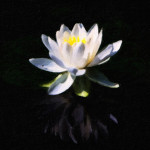Experience and Perseverance
Awakening with Cannabis: Experience & Perseverance
I have no wish to judge anyone for their preferred ways of using cannabis. It’s just that I’ve occasionally seen through the veils and found myself in an exquisite inner landscape that only reveals itself when I’m giving the plant my undivided attention. Breathing becomes deeper and more expansive. Muscles relax, the thinking mind settles and calms and I begin to feel that encompassing presence.
Synchronizing Mind and Body
If you haven’t yet entered similar landscapes when the “small self” is allowed to stand aside for awhile, it’s important to understand that experience is likely necessary, just as it is with so many other skills. Since I recently bought a car with manual transmission, it occurred to me during a cannabinized reverie that that learning process is the same in principle as learning to effectively work with the sacred herb. At first you’re not in sync with the process and aren’t sure what information to pay attention to. You’re heavy-footed and the car lurches forward when you change gears.
But every time you get behind the wheel you become more familiar with the procedures. You come to recognize the sound of the engine as it approaches the highest revs it should before you need to shift gears. You start to get a feel for when and how quickly to press the clutch in and how to time that with the releasing and re-pressing of the gas pedal. After a while you begin to feel like you’re seamless with the whole process. As Buddhist teacher Chögyam Trungpa used to say, mind and body become synchronized in the present moment.
Two Key Discoveries
Similarly with cannabis, learning to recognize and nurture the ability to allow the obscurations to dissipate is going to take repeated experiences and perseverance for the great majority of us. The thinking mind always wants to fill the space, for good or for ill. If it’s for “good,” like creative or problem-solving work, then great. However, there is a wholly other potential of mind. To find and enter it requires two key discoveries. The first is the recognition that mind’s busyness creates the obscurations and obstacles to entering the exquisite landscape. The second is that to our great surprise, as we gradually learn to tame the wild mind, we begin to see that the space of non-thought presence isn’t worthy of our fear and resistance. It’s actually a far vaster and richer way to be in the world than continually living in our heads and under the tyranny of our limiting narratives.
I know the mechanics of this phenomenon from the inside out. I don’t know how many times opportunity to fly has called and I’ve missed the flight because I got caught in “head traffic.” It may be effortless for a few blessed souls but for most of us mortals perseverance through repeated experience is the order of the day.
The Simplicity of a Swinging Door
So we sit down and pay close attention to the breath—in a relaxed way, not too serious—and notice when thoughts come up, not fighting with them but gently and non-judgmentally letting them go, again and again and again and again. In the ancient traditions it’s very simple. You just sit. As Zen master Shunryu Suzuki said, the breathing process is like a door swinging out then back in, very ordinary, very mundane on some level. But with experience it’s possible that a previously hidden delight begins to make an appearance. Another nugget of Buddhist wisdom says “emptiness becomes luminosity.”
The word “Buddha” means awake. According to the stories, the Buddha was just a person who woke up. He is reputed to have insisted that every one of us has that same nature and capability. I’ve heard a lot of people over the years say they can’t meditate, they can’t sit still, they can’t stop thinking. But the whole point and potential is that it doesn’t matter how hard it is. You just have to persevere. In fact, as a general principle, I suspect that the more compulsively busy your mind is, the more that indicates you’re afraid to look at what’s underneath the obscuring cover.
The implication is that a compulsively busy mind is obscuring great potential. Does that make sense? It’s the idea that the when the wound is deep, when the fear is great, and when the denial and the battle for control are intense, the freeing of the mind may release that much more potential.
It’s a life-long (at least) journey, not a quick fix. As Rumi put it, it doesn’t matter how many times you break your vow, your commitment. You just keep returning. Persevering through repeated experience. As an aside, Rumi is eminently quotable on this general theme, like this one from Goodreads: “Where there is ruin, there is hope for a treasure.” Or this one: “Stop acting so small. You are the universe in ecstatic motion.”
Note on the featured image in this post: It’s a “headshot” of Bob Marley made from roaches by artist Chris Maynard. It’s called Roach Paper Art. Great stuff.




Leave a Reply
Want to join the discussion?Feel free to contribute!